Peter MALONE
Saturday, 09 October 2021 13:01
Wasp Network
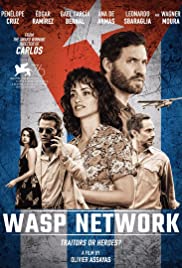
WASP NETWORK
France, 2019, 127 minutes, Colour.
Penelope Cruz, Edgar Ramirez, Gael Garcia Bernal, Ana de Armas, Wagner Moura, Leonardo Sbaraglia, Nolan Guerra, Tony Plana.
Directed by Olivier Assayas.
This is a Cuban story. The setting is the 1990s. Fidel Castro is getting older. Sanctions by the American government are biting. Life is difficult in Havana and in the countryside. So many of the Cuban refugees have settled in Miami, some for many decades, others still attempting to escape Cuba.
While the material is intrinsically interesting, the earlier part of the film seems rather ordinary, not particularly exciting. The advice would be to give the film about 50 minutes and then there is a plot twist which gives the opportunity for the audience to be more involved. However, the film does not have the dramatic tension that the subject would indicate, so, while interesting, it is somewhat disappointing, especially since the director, Olivier Assayas, had made the series on the terrorist, Carlos (with Edgar Ramirez).
The film opens in Cuba, focusing on pilot and trainer, René (Edgar Ramirez), married to Olga (Penelope Cruz, a glowing screen presence even when she is working in a factory), with a daughter. All seems normal enough even with the difficulties in Havana. René goes on a regular flight – but, preserving cover, flies to Miami and applies for American residence. Which he gains.
This leads to the opening up of the world of intrigue between Miami and Havana. René is introduced to the leaders of Cuban exiles in the US, offering his flying services, accepted by the leaders and given various missions. The leaders have harsh memories of the revolution, of the Castro regime, are bent on disrupting events in Havana, even to terrorism. René also becomes friendly with another refugee from Cuba, a charmer with a following, Juan Pablo (Wagner Moura) and his glamorous fiancee (Ana de Armas).
What emerges is that the Cuban government fights back against the Miami exiles and their leadership, infiltrating them, reporting back to frustrate the terrorist disruptions – although, the audience is shown a Latin American courier who plants bombs in the main hotels in Havana.
The second part of the film shows René in a different light, his mission in Miami, his reconciliation with his wife, the negotiations to bring her and her daughter to the US, the giving birth, her being returned to Cuba.
Later in the film, a significant character is introduced, Gerard (Gael Garcia Bernal) who is commissioned to coordinate the Cuban infiltrators in the US. When the group is arrested, René refuses to give any information about the other prisoners, and their serving a sentence in US jails.
In looking at reviews and bloggers, we find that there are divided opinions, especially because of political interests (bias?). Some comment that this is Cuban propaganda. Others see it as a picture of American policy against Communist regime.
The material and the characters are interesting – but, with so much material, this may have been better served as a specialised miniseries for television.
1. The title? The connection and network in Miami and the US, Latin America? The role of Cuba?
2. The subject, based on fact? The characters, the work, exiles in Miami, life in Cuba, infiltration of organisations? The Castro regime? American sanctions? Terrorist activities against Havana? The American government and the CIA?
3. The 1990s, towards the end of the Castro regime, memories of the revolution? The effect of the American sanctions? The life of the exiles in Miami? Preserving traditions? Culture? Anti-Communist? The Catholic tradition? The clergy and ceremonies?
4. René and his story, his work as a pilot, marriage to Olga, the daughter? His flights and training? His leaving home, taking the plane, going to Miami, the American government officials, the interrogations, his being granted residence? His getting flight jobs? Encounters with the exiles in Miami, the different meetings with the leadership, their intentions, his flights for them? Surveillance? The Coast Guard?
5. Renee in his principles, trying to contact Olga, his concern about her, their daughter? Letters, not replying? The tensions over the years? His work and friends in the US? Olga and her work in the factory? The years passing?
6. One Pablo, the Playboy style, life in Miami, his following, the organisations, the jobs? His relationship with Ana Margarita? Her background, style? The engagement? Tensions between them? The wedding ceremony? One Pablo and his sudden returning to Cuba?
7. Gerard, his background, studies, his being chosen to coordinate the network? Over the years, the various members, frustrating the CIA and the American attempts with the Miami exiles to disrupt Cuba?
8. The long episode of the recruiting of the young man in Central America, his mission, the bombs, going to Havana, leaving the bombs in the various hotels, the explosions, injuries and deaths, his being followed, arrested?
9. Olga and her reconciliation with René, pregnant, the birth of the child, the daughter in America, becoming American?
10. René, his arrest, with Gerard, the trials and imprisonment? Olga and his daughter having to return to Cuba? Serving out his sentence?
11. Audience comments on the perspective of the film – as pro Cuba? As pro US?
Published in Movie Reviews
Published in
Movie Reviews
Saturday, 09 October 2021 13:01
Blanche comme Neige/ Pure as Snow
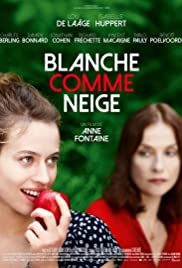
BLANCHE COMME NEIGE/PURE AS SNOW
France, 2019, 112 minutes, Colour.
Lou de Laage, Isabelle Huppert, Charles Berling, Richard Frechette, Damien Bonnard, Jonathan Cohen, Vincent Macaigne, Pablo Pauly, Benoit Poelvoorde.
Directed by Anne Fontaine.
Something of a 21st century fairy tale, Snow White in particular, a rather free-wheeling Snow White (Claire – light) who relates to seven men with passion (frequently sexual), her seven admirers (not exactly dwarfs).
The first part of the film is entitled, Claire. She is one of those luminous screen presences, played by Lou de Laage. She works in a hotel owned by her stepmother, Maud (Isabelle Huppert). Her life seems to have humdrum meaning. She is a jogger and is abducted while jogging. After an unexpected car crash, she is about to be killed but is rescued by a local farmer who has a twin brother. Initially suspicious, they care for her, as does their border, a reclusive cello player, and the local vet. She also encounters an eccentric bookseller and his martial arts trainer son.
Each in his own way seems to bring her alive, she becoming more freewheeling, passionate, sexual (this treated in a quite frank French way). Her life changes. So does that of the men though most of them while responding to her are also confused.
There is quite a lot of beautiful scenery, alpine mountain scenery, winding roads in fog and in sunlight.
Meanwhile, the second part of the film focuses on Maud. She is obviously the jealous stepmother, frequently looking in the mirror, attention to her make up. Eventually, she will take the opportunity to try to kill Claire, even with a poisoned apple.
There is a particular interest for audiences in the presence of the Catholic priest. The Catholic themes are unexpected. A south-eastern France setting, in the Alps and the Marian apparition shrine of La Salette. But, more unexpectedly, one of the ‘dwarfs’ is a priest.
And, also unexpectedly, this is a very sympathetic and understanding portrait of a middle-aged French priest. He is seen at first in a bookshop, clerical collar, owned by an atheist friend, encountering Claire, chatting in a friendly manner. He rides a motorbike and gives Claire a lift to the shrine. He is a mature man, an understanding man, showing Claire the shrine, not surprised by what she tells him of her sexual encounters. And, she surprises herself by feeling free and comfortable with him, almost immediately, to unburden herself to him. She is frank and direct. He reassures her indicating the wide range of sin that he is told. He also quotes Jesus’ words of not judging. He is shown to be exactly what a good man, a celibate priest, ought to be like.
His ministry extends to meeting Claire’s stepmother, Maude, the evil, jealous, murderous stepmother. She feels comfortable with him as he welcomes her to the shrine, talking openly and personably. She has malevolent intentions in meeting Claire. The priest, not knowing this, is able to find an opportunity to bring Maud and the unsuspecting Claire together.
At the end, Claire lying in hospital after Maud’s attack on her, the seven men come to her bedside, some kissing her, others respectfully touching her. The priest simply signs the cross on her forehead.
Quite a sympathetic picture of a priest (especially in the era of widespread clerical abuse).
1. The title? Snow White? The jealous stepmother? The seven dwarfs?
2. The familiar fairytale? 21st-century interpretation? In a French context? In a frank French style?
3. The strong cast? The younger woman, luminous? The older woman, malevolent? The range of men, the responses to Claire?
4. The French city setting, the hotel, the countryside and jogging? The beautiful Alpine scenery, the winding roads and mountains? The village, houses, that, bookshop, cafe? The shrine of La Salette? Exteriors, interiors, cloisters, Chapel?
5. The introduction to Claire, her age, relationship with her stepmother, her dead father? Her mother’s new partner and the attraction? Her work? Her jogging? The abduction, in the boot of the car? The mountain roads? The crash? Running through the forest, the driver catching up with her, the gun? The assassin being shot? Claire rescued by Pierre? Taken to the house, coming to consciousness, peer washing her clothes, caring for her? No police, his past time in jail? His twin brother, François, and his stammer?
6. The introduction to Vincent, bringing her the meal, his story, the studious and hypochondriac, his music, the cello, avoiding Grenoble? His dog? Going to the vet? The introduction to Sam? The treatment of the dog? Sam’s return to the house?
7. Claire in the town, at the bookshop, Charles, his eccentricity, his friendship with the priest? The discussions? The encounters with Charles, his advances, but wanting to be correct? The introduction to his son, Clement, his shyness, martial arts, reticence with Claire?
8. Getting the job, working at the cafe, encountering Charles and his son, encounters with Sam? Life in the town, the dances and clears exuberance? Dancing with Sam, the date, the intruder on the dance, Clement and his martial arts?
9. The sexual encounters, her passion, with Pierre, the secrecy with François, the time with Sam, Clement that his reticence – and the later lyrical encounter in the forest?
10. The portrait of the priest, middle-aged, the shrine, what a priest should be like? The motor bike, giving Claire the ride, showing her the shrine, her confiding in him, his not judging, his telling her that he has heard many scenes? Maud, her going to the shrine, the welcomed by the priest, their discussions, arranging for a meeting between Maud and Claire?
11. Maud, looking in the mirror, the wicked stepmother, vanity, the relationship with Bernard? The tensions? Separation? The influence of Claire? Claire and her phone calls and her hanging up?
12. Her driving to meet Claire, the priest and the shrine, the encounter with Claire? Friendship, discussions? Her observing? Surprised at Claire’s passion? He’ll intentions, the social, putting the poison in the apple? The picnic? Claire giving the apple away, Maud’s frustration? The poison in the drinks? Claire’s collapse, in the car, pushing her over the cliff? Maud against the shrine, prayer, lighting the candle? Her scarf catching Fire and her death?
13. Clare, the rescue, in hospital, the seven men, those who kissed her, those who touched her, the priest signing the cross on her forehead?
14. The light? Claire did or alive?
15. Ocean of the classic fairytale?
Published in Movie Reviews
Published in
Movie Reviews
Saturday, 09 October 2021 13:01
Deadly Slumber
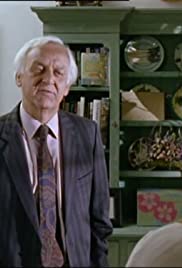
DEADLY SLUMBER
UK, 1993, 103 minutes, Colour.
John Thaw, Kevin Whately, Brian Cox, Janet Suzman, Jason Durr, Richard Owens, Robert Swann, Patrick Godfrey, Pennie Downey, James Grout., Ian Mc Niece.
Directed by Stuart Orme.
Deadly Slumber is one of 33 television adaptations of Colin Dexter novels with John Thaw as Inspector Morse and Kevin Whately as Sgt Lewis. It is an entertaining and interesting episode, quite complicated murder scenario, intricate, Morse and Lewis eventually unravelling the mystery.
There are Oxford settings, the clinic, hospitals, a young woman in terminal coma. Her father, a very successful and wealthy bookmaker, Brian Cox always effective, has taken the authorities to court but lost. He still wants revenge. There are complications with the institution, the fragile health state of the doctor’s wife, Janet Suzman, and her role in the episode. There is also the complication of their student son, played by Jason Durr. The anaesthetist for the operation has a complex relationship with the doctors. She is played by Pennie Downey.
There are layers on layers in this episode, some mastermind manipulation of characters, some lies and deceits for alibis. Morse becomes very friendly with the bookmaker, quite sympathetic, visiting his daughter – so that his disillusionment at the end is quite painful for him.
Interesting, as always, and well acted.
1. The popularity of Inspector Morse mysteries? The novels of Colin Dexter? The screen adaptations? The presence of John Thaw as Morse? Kevin Whately as Lewis?
2. The Oxford settings, the city, universities, houses, the countryside? Hospitals? The musical score?
3. The title, Michael Steppings and his daughter, the institution, Dr Brewster and his wife, nurse Hazlitt, the small operation, anaesthetic, mishap, the daughter going into fatal coma? Her father keeping her alive? His vigils? His wanting vengeance?
4. The introduction to Claire Brewster, her personality, waiting for her husband? The relationship? The starting of the clinic, his work, her work? The court case? Steppings and his attack? The court vindication? The consequences?
5. The death of Dr Brewster? In his car? The presence of his son, his son’s edgy personality? The reaction of his wife? The police called in? Morse and Lewis? The interrogations? Audience sympathies not towards the Brewster’s? John Brewster and his relationship with Jane, his edgy behaviour, the night of the death, her suspicions?
6. The reputation of Michael Steppings, bookmaker, fortune, devotion to his daughter? His wealth, the country house? His wanting revenge? The anonymous letters? His genial personality, friendship with Morse, sharing the drink? His alibis? The visits to his daughter? Morse and his sympathy? Bringing the flowers?
7. The interviews with Wendy Hazlitt, her role as a nurse, at the institution with the Brewsters, her transfer to the hospital with Steppings daughter? Her artwork, paintings? Morse and his admiration? The interviews, her going on holidays? The irony of Morse’s visit to Steppings mansion, the view, seeing it in the painting?
8. The complications with Dr Brewster, the affair with Nurse Hazlitt, the secrecy, the nurse claiming his wife knew, his wife denying it? The involvement of his son?
9. The manner of the murder, the car, the garage, the fumes? The use of diving equipment by the murderer? The link to Jane, the club, the shop, her equipment? John Brewster and his entanglement with Steppings, the fullest participation? His giving himself up, in prison? For his mother?
10. Steppings, the time line, driving, at the pub, the witnesses, the testimony of the woman who found his wallet, handing it in? Yorkshire? The fingerprints? The later revelation that it was Wendy Hazlitt?
11. The conspiracy, the involvement of John Brewster, his lies, agitation, waiting for his father, the arrangements for the death? The diving equipment? The notes and the threats?
12. Morse confronting Steppings, his disappointment and disillusionment? The truth? The work of Morse, the detection, Lewis and his work in interviews? Morse throwing flowers into the rubbish?
13. The girl’s mother, coming to the hospital, turning of the equipment?
14. The tangle of truth and lies, the motivation for revenge? Steppings and he is using people?
Published in Movie Reviews
Published in
Movie Reviews
Saturday, 09 October 2021 13:01
Rock'n Roll
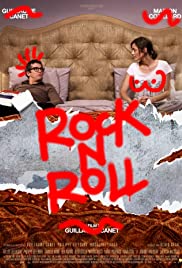
ROCK 'N ROLL
France, 2017, 123 minutes, Colour.
Guillaume Canet, Marion Cotillard, Gilles Lelouche, Philippe Lefebvre, Camille Rowe, Kev Adams, Ben Foster, Maxim Nucci, Yvan Attal, Alain Attal, Johnny Hallyday, Laeticia Hallyday.
Directed by Guillaume Canet.
This is a very French film. It is something of an insider joke, looking at the French film industry, producers and their expectations, details of filming, a focus on film stars and their behaviour, tantrums, difficulties, ambitions. And, perhaps, it could see something of a vanity project for writer-director-actor, Guillaume Canet.
Canet appears with his real-life partner, Marion Cotillard as well as with their young son. The characters retain their real names but are stylised versions of themselves, with serious touches, but with a lot of comic touches. Various friends also appear in the film with their own names, variations on their themes, especially Gilles Lellouche as a longtime friend but more settled into his life and career, Camille Rowe as an up-and-coming actress, very much of the 21st-century, making comments on the stars of the past. American actor Ben Foster also appears as producer, casting director whom Canet approaches to get a role as a younger character. Produces Yvan and Alain Attal also appear as themselves, frustrated by the Canet character and his transformations. There is also a visit to the home of veteran singer-actor, Johnny Hallyday and his wife Laeticia.
The basic idea of the film is that Canet himself, referring to his background in horseriding, has been a successful actor but is now in his early 1940s. He takes very badly the comments of the young star whom he now meets and co-stars with (acting as her father and as a pastor). She does not mean to insult him but she comments on his age, his past career, his having to settle into the reality of the 40s.
This unsettles him, he fancies himself as a rock ‘n roll singer and player, identifying with his 20s. The comment so disturbs him that he tries to go to clubs and mix with younger people only to be derided by them. He still fancies his sexual prowess. At home, he lives with Marion Cotillard who is preparing to star in a Canadian film and spends a lot of the time trying to perfect her Canadian vocabulary and her Canadian accent. They are both devoted to their son.
The upshot is that Canet wants to transform himself, make himself look younger – which involves going to a plastic surgery expert, having worked on his lips, on his face – making him look absolutely younger, to the criticisms of Marion, the reaction of his son, the disbelief of the director of the film he is making (and causing all kinds of problems by tantrums and walk-offs), to the producers of the film. His face becomes more and more transformed, almost unrecognisable – and ridiculous.
The producers want to make him pay hundreds of thousands of dollars because of the cancellation of the film because of his behaviour.
Eventually, he receives an invitation to go to Florida, to make a television series about hunters and the Everglades, alligators. After some time, he is joined by Marion’s son and they continue into a second series of the television program.
More effective for French audiences who know the stars. A curiosity item for others.
Published in Movie Reviews
Published in
Movie Reviews
Saturday, 09 October 2021 13:01
Pale Horse, The
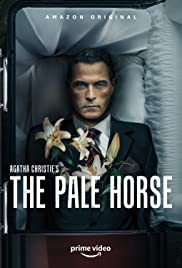
THE PALE HORSE
UK, 2020, 116 minutes, Colour.
Rufus Sewell, Kaya Scodelario, Georgina Campbell, Kathy Kiera Clarke, Sean Pertwee, Sheila Atim, Bertie Carvel, Rita Tushingham, Henry Lloyd- Hughes.
Directed by Leonora Lonsdale.
The Pale Horse is the fifth adaptation of an Agatha Christie story by prolific English writer for television, Sarah Phelps (50 episodes of East Enders, adapting Dickens and JK Rowling as well). They are very much 21st-century adaptations of Agatha Christie, letting go of the author’s general restraint in describing characters and plots. In fact, many aspects of the adaptations could be considered sensationalist. While some reviewers and the public applauded these adaptations, the majority of Agatha Christie fans were not pleased. This was especially the case with The ABC Murders, with John Malkovich as Poirot – and the hypothesis that he was a parish priest in Belgium, rather than a police chief, disenchanted with German murder of his parishioners and so coming to England.
The Pale Horse was published in 1961 and echoes the atmosphere of the times in its characters and some supernatural elements of plot. There is a focus here on witches, fortune-telling, the witches and their curses and deaths. There is also some scepticism about this belief in the supernatural, especially by one of the characters responsible for some of the deaths.
At the centre is Rufus Sewell, an antiques dealer, covering up the accidental death of his wife, marrying again, been preoccupied with memories of his first wife’s death, a list being found of people who were to die, a question mark behind his name. And then there are the three witches (with Rita Tushingham as the old which). There is also a police Inspector played by Sean Pertwee.
While Rufus Sewell is at the centre, a shopkeeper played by Bertie Carvel turns out to be a very human character, responsible for deaths rather than witchcraft. The ending, after the portrayal of the central character as tormented, having nightmares, fantasies, consulting the witches to lift the curse, is rather ambiguous as to his final state.
1. An Agatha Christie story? From the early 1960s? This 21st-century adaptation? The alteration of characters, situations? The strong criticism from fans?
2. The early 1960s, London, the streets, cars, homes? Shops? The visit to the village? The hotel, The Pale Horse? The musical score?
3. The element of the supernatural? The popularity on novels and films of the period? Witchcraft? Superstitions? Fortune-telling?
4. Dreams, fantasies, fears, nightmares? The interchange between reality and nightmares? The mystery of the ending?
5. The situation, the dying woman, her list, the names, the question mark after Mark? The women? Ardingly? Osborne?
6. The focus on Mark Easterbrook? Antique dealer? His own personality? Marrying Delphine? His suspicions, cross-examining her, her electrocution? His covering up? The police inspector, the discussions, the suspicions? His marrying Hermia? The relationship with her? Suspicions, animosity? His relationship with Thomasina? Her death? The death of the woman with the list? Hair falling out? His discussions with David Ardingly? The encounters with Zachariah Osborne? The insinuations about the women? Witches? Their power, violence, being paid?
7. The image of the three witches, the fortune-telling for Delphine? The ominous presence? Perceived by Mark? The insinuations about their power? At The Pale Horse, in the village? Their presence at the funeral? Influence on the dead woman? Mark going to visit them, wanting them to lift the curse, his memories, their effect, not wanting to see him again?
8. Ardingly, his aunt, arranging her death, his greed? The connection with the witches? Information? Mark confronting Ardingly in the basement?
9. The inspector, his suspicions, interrogations? His collapse, seen in the hospital, his death? The influence of the witches? The poisoning by Osborne?
10. The continuous presence of Osborne, his manner, connection with Mark? Intimations about the witches? The revelation of his malevolence? The poisoning?
11. Hermia, her character, vanity, clothes, suspicions of Mark, drugs? Her collapse? Hospital, the recovery?
12. Mark, the effect of these experiences, on his character, the memories of Delphine’s death, the discussions with the inspector, the interactions with Hermia, thinking that she hated him, wanted his death? The malevolence of Osborne?
13. The ambiguity of the ending – and the fans being critical of the ending and its seeming confusion?
Published in Movie Reviews
Published in
Movie Reviews
Saturday, 09 October 2021 13:01
City of Missing Girls
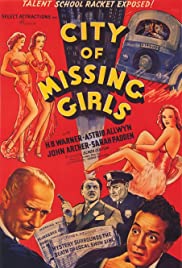
CITY OF MISSING GIRLS
US, 1941, 71 minutes, Black and white.
H.B.Warner, Astrid Alwyn, John Archer, Philip Van Zandt, Sarah Padden.
Directed by Elmer Clifton.
This is a police investigation drama, along with newspaper reporting. It has an unsavoury subject – but this was 1941, the Code had been introduced and, the darker realities of the plot was made somewhat respectable -looking.
H.B. Warner, who had been Cecil B. De Mille’s Jesus in 1927 (and his last film was De Mille’s 1956 The 10 Commandments) is a police chief who loves his job and keeps working instead of retiring. John Archer is the assistant district attorney, committed to uncovering crime – and, both are faced with a number of girls being abducted, two of them turning up dead. The district attorney is in love with a reporter, full of energy and verve, daughter of an entertainment entrepreneur.
There is a very emotional scene where the assistant district attorney and the chief comfort a grandmother whose granddaughter has disappeared.
The main person under suspicion is the proprietor of nightclubs, played by Philip Van Zandt. With the entrepreneur, he auditions young girls and contracts them out to club owners around the United States. In fact, while it is not explicitly spelt out, they are hired out for prostitution.
There are confrontations between the nightclub owner and the police, his trying to set up the district attorney in a compromising photo with one of the girls, offers him a $10,000 bribe which he refuses. The complication of the plot is that the journalist is the daughter of the entrepreneur. She decides to infiltrate and to go for an audition to find out what happens to the girls, is recognised, her father set up, his refusal to comply, his being shot by the nightclub owner. It is the photographer of the compromising photos who gives up the information to the police.
H.B.Warner brings some dignity and decorum to the proceedings – although he is fond of winking in collusion with the district attorney and has a comic scene being roused from his sleep.
Published in Movie Reviews
Published in
Movie Reviews
Saturday, 09 October 2021 13:01
Sacrament, The

THE SACRAMENT
US, 2013, 99 minutes, Colour.
Joe Swanberg, A.J. Bowen, Kentucky Audley, Gene Jones, Amy Seimnetz, Kate Forbes.
Directed by Ti West.
The Sacrament is quite a striking film. It was directed by Ti West, more of a specialist at this period of his career in horror films, especially with The Innkeepers. His later work was in television.
This film uses the devices of “found footage�. A young man is interviewed by a New York television station, the story of his sister, former drug addict, moving out of the US to an isolated commune, Eden Parish. The team go to the parish to find a story and for the young man to meet his sister.
Audiences familiar with the story of Jonestown in 1978, the leadership of Jim Jones, a powerful cult leader, brainwashing his followers, leading to their mass suicide, will see the parallels with this story.
The leader of the cult, Father, a powerful performance by Gene Jones, large, dominating, smiling, dark glasses, greeting his followers… offers a disturbing rationale of the cult in an interview with the television crew. At the beginning, he is all sweetness and light, people sacrificing their savings to set up the parish. However, he is against American culture and politics, detached from modern technical culture, then turning the interview against the interviewers and denouncing them.
There are interviews with many of those who have joined the parish – but a caution when a woman asks if they will take her mute daughter away with them. The next morning, there are quite a number of people who want to leave, conflict amongst the followers. It is at this stage that Father gets his followers to prepare the drink, laced with poison, so that all his followers will choose their time of death rather than being attacked and killed by American invaders.
The film is initially intriguing with audiences wondering about the cult. Then it becomes quite challenging with Father and his interview. Then it becomes more disturbing as the journalists become more anxious. Then it becomes horrifying with the mass suicide and its consequences.
It is well worth seeing to experience this kind of cult made plausible, dramatised, then the revelation of the brainwashing and the disastrous consequences.
1. The title? Expectations? Religious dimensions? The revelation of the poisoned drink, as a sacrament for the members of the cult?
2. The tradition of the found footage films, the journey, investigation, the role of the camera operator, the handheld camera work, fixed camera? The overall effect to make the footage seem authentic?
3. The introduction to the theme, the story, Patrick and his coming to the television station, the network and its filming? The interview with Sam? Jake is the photographer? The decision to follow the story, to film it?
4. Patrick, his background, Caroline writing to him, her drug addiction, her reform, going to Eden Parish? Her invitation for him to come? Patrick going with the team? The helicopter ride? Going into the Parish? Beyond the United States? An isolated community?
5. The first impressions, the countryside, the layout, the huts? The assembly point? Caroline and her enthusiasm? The devotion to Father? The men going to their quarters? The questions? The interviews with the various people, the young woman from Australia, the infirmarian, other members, their enthusiasm, the huts, the Centre for medical attention, the children? The caution with the woman and her mute little girl, warning them? And the later message for them to take the little girl?
6. The background of cults, isolation, the range of devotees, no racial discrimination, the members giving up their homes and incomes to fund the parish? Their happiness together? The young black men and their enthusiasm? The buildup to the appearance of Father? The complete devotion to the leader?
7. Audience knowledge of Jim Jones and Jonestown? The community? 1978? The cult? The mass suicide? The parallels with this story?
8. The gathering, Father and his entry, his appearance, big, genial, the dark glasses? Welcoming everyone, embracing? His allowing the interview? Jake filming? Sam and his preparation, the questions?
9. The impact of the interview, the long speeches by Father, the background of the parish, setting it up, the people coming? The scriptural references? The religious dimension? Sam and his being bewildered? Asking the questions about the armed men? Father’s reaction, twisting the question? His denunciation of the media and its spinning stories?
10. The aftermath, the celebration, the singing? Everybody happy? Patrick and his disappearance, Caroline and her story, enthusiasm, providing Patrick with women?
11. The effect on Sam and Jake, disturbed, the mother and her wanting them to take the little girl, her being beaten? The sentries and their prowling? The armed men? The night passing?
12. The next morning, the attention to details of time? Patrick and his rejoining the men? The preparation to leave? The group of people and their wanting to leave? The interactions amongst the group, persuading them not to leave?
13. Father, the preparation for the drink, the poison, the group preparing, his words, apocalyptic, wanting them to go to death under their own terms, creating the fear of an American invasion and deaths? The people drinking? The children? Mothers and children? The foaming at the mouth, the collapse and death? Those reluctant, the young black man, his being persuaded? Eventually everybody dead? The armed patrols?
14. The helicopter arriving, the shooting of the pilot? Sam and Jake, the camera, on the ground, filming? Going back to the compound? Patrick and Caroline, her killing her brother?
15. The final meeting with Father, his explanations, rationalisations? Shooting himself?
16. Sam and Jake, getting to the helicopter, the wounded pilot, taking off, the final views of Eden Parish?
17. A portrait of cult, cult leaders, the response of the followers, the brainwashing, the religious motivation, the dominance of the leader, the leader setting the rules, morality? Incorporating the best of community? But complete domination – even to death?
Published in Movie Reviews
Published in
Movie Reviews
Saturday, 09 October 2021 13:01
It Must be Heaven
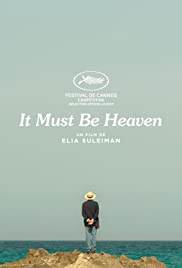
IT MUST BE HEAVEN
Palestine, 2019, 102 minutes, Colour.
Elia Suleiman, Gregoire Colin, Gael Garcia Bernal, Stephen Mc Hattie.
Directed by Elia Suleiman.
It must be Heaven. Not quite. And the question also arises: can there be peace on earth?
Those who know the films of writer-director, performer, Elia Suleiman, know that he is an expert at a particular kind of comedy, partly deadpan, partly satire and parody, partly gentle about human nature. But, all the time, he is also making political point.
He directed documentaries in the 1990s, especially about Palestine. He himself is a Palestinian who comes from Nazareth. Into the 21st-century and he made a number of comedies (which are worth recommending to those who might be coming to his work via this film; in 2002 there was Divine Intervention, in 2009, The Time that Remains).
Practically everyone makes the comparison with the French comedies of CJacques Tati, especially his character, Monsieur Hulot. Tati, early in his career, tall and gaunt. Elia Suleiman is rather shorter, a touch more rotund, distinctive with rather shabbier clothes, always a coat, always a hat. He is in middle-age. He is bearded, bespectacled. He barely says a word throughout the whole film. Tati was a master of mine in the eccentricities of ordinary situations. So too, Suleiman in his character ES, with his hands always behind his back, like Tati. But he generally stands, sits, observes. He can be described as enigmatic, quizzical, a spectator curious about the human race.
He sets a tone at the beginning with a religious ceremony, robed Christian clergy, the faithful, many of them very young, a cross and a symbolic knocking at the door of the tomb – but the man behind the door is refusing to open, the celebrant taking off his crown, going behind the scenes, sounds of a fight, the door opening and the faithful invited in. We are not (never) sure what it means but it does set the comic tone.
The first part of the film is quiet, ES in his native Nazareth, alone in his apartment, wandering the streets, sitting in cafes, visiting his wife’s grave, exploring the countryside. Then he flies to Paris – nervously looking out the window at what seems to be a shuddering wing. However, he becomes a tourist in Paris, the audience wandering and observing with him, the monuments, the sites, a menacing stranger staring at him in the metro, beggars in the street served food by workers driving an ambulance, nuns serving at an outdoor soup kitchen, a priest standing smoking and observing, all kinds of detail. However, there is a purpose in visiting Paris, to raise money for a film about Palestine, with a lot of discussion about how such a film could be made, how polemic it should be, how political – or rather should it be simply showing a character like ES visiting France and the US.
Because the US is his next destination, similar kinds of tourism and observing, an encounter with Gael Garcia Bernal as he goes to discuss production finance in New York City – and failing again. This time there are more explicit references to Palestine, a strong rally of exiled Palestinians, a conference and his sitting on a panel.
One commentator remarked that It must be Heaven is comedy of the absurd. It is. However, the commentator added “absolute nonsense – but in a good sense�.
1. The films of Elia Suleiman? Palestinian? Palestinian background? Israel? Political perspectives? Comic perspectives? Humour, satire, political point?
2. The initial part of the film in Palestine? Nazareth? The streets, homes, shops? The surrounding countryside? The cemetery? The fields? The transition to Paris, the well-known landmarks? The streets, cafes, hotels, film production offices? The transition to New York City? The city, the meetings, hotels, film offices? The range of the musical score? Local songs?
3. The title? Aspects of paradise? The reality of Earth? Desires for peace on earth?
4. The filmmaker and his writing, production, directing? His performance? His style, memories of Jacques Tutty and Mr Malone? Really speaking? Standing, observing? His age, clothes, beard, hat? Observing and enquiring? The style of the comedy, small incidents, characters, exaggerations, pratfalls? The touches of parody?
5. The prologue, the Christians, the ritual ceremony, the clergy in robes, the young faithful, the ceremony of the opening of the door, the refusal, the reaction of the Bishop, going behind the door, the violence, the door opening and everybody invited to worship? Setting a tone to the film?
6. The experience of Nazareth, for the film go out, impressions of the city? As a Palestinian city? As an Israeli city? The details of life? The experience of Paris, the jokes on the plane and the directors fear, landing in Paris, tourist views and jokes, the comparison between Paris and Nazareth? The contrast with New York City? The Palestinian exiles in their meeting? The conferences and the panels?
7. The comment on the situation in Palestine, between Israel and Palestine, by looking at life in France and in the United States?
8. The background of filmmaking, raising finance? The expectations of the French producers? The interviews, the nature of comedy, the nature of politics? Rejection? The discussion of what the present film was doing? The transition to the United States, the intervention of Gael Garcia banal? The ironic comments about films about Mexico and the conquistadors in English?
9. The range of supporting characters? Characters in Nazareth, flight attendants, in restaurants, the poor in the street, the nuns and the soup kitchen, the smoking priest and his
standing by? Busy New York City, airports, guards, restaurants? Gangs – and the humour of gangs of youths suddenly appearing in the streets and the reaction of the director?
10. The ultimate impact of the film? In terms of comedy and enjoyment? In terms of message? With relation to Palestine and the directors continued interest over his career?
Published in Movie Reviews
Published in
Movie Reviews
Saturday, 09 October 2021 13:01
Appropriate Behaviour
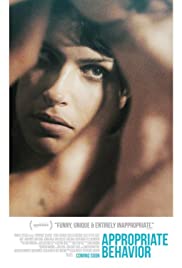
APPROPRIATE BEHAVIOUR
US, 2014, 83 minutes, Colour.
Desiree Akhavan, Rebecca Henderson, Halley Feiffer, Ryan Fitzsimons.
Directed by Desiree Akhavan.
Appropriate behaviour is a continual challenge for the central character, Shirin, living in Brooklyn, Iranians parents. She is in her late 20s, tall and striking, strong-minded in many ways, lacking self-confidence in others. Her orientation is lesbian but she has not found the time to explain this to her parents.
The film was written and directed by Desiree Akhavan who also appears in the central role. She comes across very forcefully, even when her character is not forceful in some situations.
The film opens with her walking out on her partner, Maxine (Rebecca Anderson) and getting advice from her friend Crystal (Halley Feiffer). She finds another place to stay, her brother and her parents critical. A friend of Crystal also organises a job, training filmmakers of Brooklyn – for her to find that they are all five years old! She is quite out of her depth with the young children, understanding them, how she would behave towards them – especially as they are often raucous.
There are many flashbacks to her relationship with Maxine, the initial encounter, the attraction, living together. Maxine is much more matter-of-fact than Shirin. While Shirin is attracted and the two are in love, Shirin botches many situations. Shirin intrudes on a meeting, is attracted to a legal professor and has a date with her, teams up with men through online dating, has sexual encounters, describes herself as bisexual.
The film is a slice of life, looking back into the past with some regrets, some muddling in the present – and leaving the audience to wonder about the prospects for the future.
Published in Movie Reviews
Published in
Movie Reviews
Saturday, 09 October 2021 13:01
Wild Goose Lake
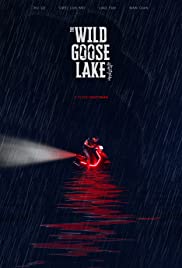
THE WILD GOOSE LAKE
China, 2019, 113 minutes, Colour.
Ge Hu, Lun- Mei Kwei, Fan Liao, Regina Wan.
Directed by Yi'nan Diao.
The Wild Goose Lake is an area on the outskirts of a provincial Chinese town.
The audience is introduced to a large group of young men, gathered in a warehouse, enthusiastic. However, this is rather misleading. The men belong to gangs, drug dealers apportioned particular areas of the town for operation, many of the men bikies with some focus on the bikes.
The director of this film, Yi’nan Diao won the main prize at the 2014 Berlin film Festival for his social drama, a police investigation of a series of murders, Black Coal, Thin Ice. Once again, he has focused on a murder, police investigation.
The central character is a leader of the group, seen giving speeches, but soon involved in hiding because of his shooting of a policeman. While the film continues to show the work of the police, the reactions of other members of the gang, it concentrates on the leader himself, his ability to hide, conceal himself from the police.
The film has unexpected turns, especially with a prostitute, an enigmatic woman in red, approaching the man, mysterious in her character and behaviour, saying she was sent to him by his wife. She helps him in his continued hiding, at some risk to herself, becoming the victim of a sexual assault.
Then the film moves in something of a different direction, the issue of reward for the capture of the man. He would like to arrange a situation where his wife becomes the beneficiary of the reward money.
Which then takes the audience in yet another direction and a re-appreciation of the gang leader as well as the prostitute who has helped him.
The film has won some awards and has highly appreciative responses on the IMDb.
1. The title? The region, the town, the lake?
2. The locations, the town, homes, streets? The warehouse? The drug deals? The musical score?
3. The atmosphere of the town, provincial, expectations? The group of men gathered? The leader? The revelation of drug deals, motorcycles? The age of the men?
4. The police, the investigations, the leadership? The attacks, tactics?
5. Zenang Zhou, personality, leadership? The other leaders, his role?
6. His escape, hiding, the revelation about the shooting, the police, death? The woman coming to him, saying she was sent by his wife, her being a prostitute? Her leading him, protecting him?
7. The complexity of the plot, his of ageing the police, their blaming him, the other members of the group? The woman, seductive, pressurising him, the story about his wife?
8. His ability to hide, the work of the police, the leader? The role of the woman, hiding him, the sexual liaison? The prostitute and the brutality of her being raped?
9. His relationship with his wife, the past, her concern? The woman getting her?
10. The issue of the reward, the amount, the concern of Zenang, of the woman?
11. The unexpected chase, the melodrama, his death?
12. The woman claiming the money, the police, saying she would bank the money, the men following her, seeing her with the wife, their leaving with the money?
13. Zenang sacrificing his life for his wife?
Published in Movie Reviews
Published in
Movie Reviews